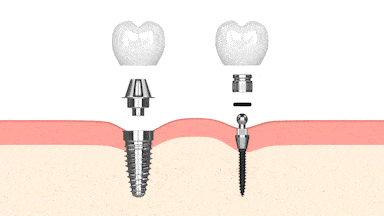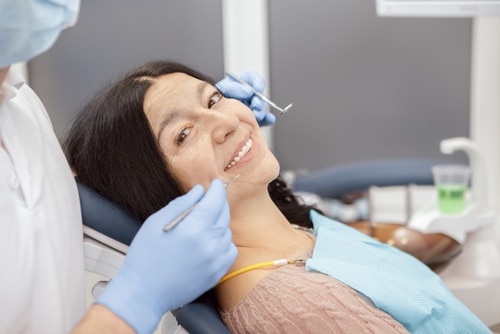Dental Implants in Countryside, IL
More than three million people in the United States have implants. Dental implants can help you eat and speak normally without having to worry about loose or uncomfortable dentures. If you have missing teeth, Hope Dental can provide you with mini dental implants.
What Are Dental Implants?
When you lose a tooth, you can experience trouble speaking and chewing as well as rapid bone loss because your jawbone no longer receives the stimulation it needs from the tooth’s root.
A dental implant is a medical device that can function as a natural tooth, restoring your bite’s full function and preventing further bone loss.
Traditional dental implants consist of three main parts:
- Post
- Abutment
- Crown
The post works as the tooth’s root, while the abutment connects the crown to the post.
At Hope Dental, we offer mini dental implants — a simpler option to help you get full use of your teeth again without the complex procedure that traditional implants require.
Mini dental implants are smaller than traditional implants. They only have one piece, minimizing the potential for bacteria build up, and they do not require as much space as traditional implants.
Mini dental implants can be a good option for people who:
- Have a narrow jaw
- Are in good overall health
- Do not have much jawbone density
If you have serious medical conditions like diabetes, vascular diseases, or blood clotting issues, you may not be the right candidate for dental implants.
Traditional Dental Implants vs. Mini Dental Implants
 When it’s time to choose the right dental implants, you want to know the benefits that mini dental implants offer.
When it’s time to choose the right dental implants, you want to know the benefits that mini dental implants offer.
Because mini dental implants are smaller than traditional dental implants, they can work better in narrower jaws. They have a diameter of less than 3 mm, which allows us to fit them into place even in the tightest spaces.
Mini dental implants do not require a lot of bone density. If you have suffered some bone loss already because of a missing tooth, a traditional dental implant would require that you get a bone graft. A bone graft can delay the implant procedure and make the entire process more expensive. Bone grafting is not necessary with a mini dental implant.
The process of getting traditional dental implants into place can be more complex and take more time. With traditional implants, we will need to suture the incisions we make, which requires a longer recovery time.
That’s not the case with mini dental implants. You can usually get them in one appointment without having to worry about caring for sutures.
Mini dental implants are also more affordable than traditional implants.
Preparation for Dental Implants
If you think you’re a good candidate for dental implants, your first step is to reach out to us at Hope Dental. During your Free consultation, we’ll assess whether you can benefit from mini dental implants.
We will ask you about your medical history and any medications you take. To check the degree of jawbone density you have and see where the implants will work most effectively, we will take some X-rays of your mouth.
At the consultation, you can also ask us about the procedure and what you should expect in terms of the process and your recovery. We’ll tell you about the anesthetics we use, the steps in the treatment plan, and finally, the cost of the mini dental implants.
At Hope Dental, we offer a variety of payment options, including third-party financing that begins with a 0% interest rate. Because we can leverage many different financing partners, we can help you afford the treatment you need.
If you have dental anxiety, we can also offer sedation options. Our team can provide laughing gas and oral sedatives. If you choose an oral sedative, we usually need you to come to the office before the procedure to give the sedative time to take effect.
To help the procedure go as smoothly as possible, we recommend that you do not take blood-thinning medications or supplements in the days leading up to your appointment. If you smoke, consider stopping.
The Dental Implant Procedure
 We begin the mini dental implant procedure by applying an anesthetic to the treatment area to numb your jaw and gum.
We begin the mini dental implant procedure by applying an anesthetic to the treatment area to numb your jaw and gum.
A mini dental implant does not require us to drill down into your jaw, so all we have to do is make a small hole in your gum and insert the implant. Once we tighten the titanium post into place, we will adjust the implant so it fits comfortably. We’ll then add the false tooth by using the O-ring on the post to snap it into place.
Because we do not perform incisions for mini dental implants, we do not have to suture your gums.
Once we finish, you are free to leave. Remember to have someone with you if you plan to receive oral sedation.
Recovery and Aftercare
Recovering from a mini dental implant procedure is much easier than from a traditional implant. Having no sutures to worry about can speed up the healing process, allowing you to return to eating and drinking normally.
During the first couple of days after the procedure, you want to avoid hard or sticky foods. You may also want to avoid very cold or hot drinks. Do not smoke because it can slow down the healing process and can even lead to infections.
If you feel any discomfort, you can turn to over-the-counter painkillers as well as ice packs.
To keep the area clean as you recover, we recommend rinsing your mouth with salt water. The recovery process can take one to two days.
Caring for your dental implants can help them last longer. You want to take care of them as you would your natural teeth, especially by brushing them at least twice a day and preferably after every meal. Floss once a day and use a mouthwash that does not contain alcohol.
Many kinds of toothpaste can be abrasive, which can damage the implants. If you’re not sure about the toothpaste options best suited for implants, we can help.
Grinding your teeth can be harmful to both your natural teeth and your mini dental implants. The pressure that your jaw can put on the teeth can crack or chip them. To avoid this, consider getting a mouthguard.
Like natural teeth, dental implants can get stained. Limit your intake of colas, coffee, red wine, and tobacco products to keep the implants looking radiant.
Make sure that you schedule regular checkup appointments with us. We can perform deep cleanings and check for any signs of damage to your implants.
Turn to The Dental Implant Experts in Cook County
Having missing teeth can make speaking, chewing, and even smiling more difficult. You may find yourself avoiding certain foods or having trouble saying some consonants, which can lower your quality of life. There’s no reason to go through this when help is available.
Dr. Russell Ras is one of the leading experts in Cook County, IL, offering mini dental implants for those who want a less-invasive, more affordable solution to missing teeth. With over 30 years of providing quality services in the same location, Dr. Ras can help you get full use of your teeth once more.
Don’t wait another minute. Call Hope Dental today.
Questions & Answers
Dental implants are a solution for many but having enough healthy bone to support your implants is a key factor. If your jaw has become worn and thin over the years, a bone graft may be necessary before an implant procedure can be executed. Book your consultation with Dr. Ras to see if dental implants are right for you.
Dr. Ras completes all of his procedures with his expertise and leading dental technology. This allows for precision and as little discomfort as possible. With proper aftercare, you can expect minimal swelling and almost no bleeding. You can count on our team to help you every step of the way, including with your after care.
Absolutely! Dental implants are practically indistinguishable from natural teeth and will leave you feeling confident and comfortable with your new and improved smile.
It is important to care for your implants the same way you would your natural teeth. Make sure to continue brushing, flossing, and attending your regular checkups.
The cost of your dental implants will depend on the custom solution that is right for you. After your first consultation, our treatment coordinator will provide you with a quote.
Dental implants are a covered procedure by most dental insurance companies, but we advise you to contact your insurance provider to find out what your plan covers.
related videos
- What is a Dental Implant?
- Dental Implant Process Explained?
- Who is a Candidate for a Dental Implant?
- Benefits of Dental Implants?
- Do Dental Implants Hurt?
- Dental Implant Post-Op Instructions?
- How Do I Care for my Dental Implant?
- How Long Do Dental Implants Last?
- How Long Does it Take to Get a Dental Implant?
- How Much Do Dental Implants Cost?
- Financing Options for Dental Implants?
- If I Have Bone Loss Can I Still Get a Dental Implant?
- Dental Implant Healing Times?
- Does Dental Insurance Cover Dental Implants?
